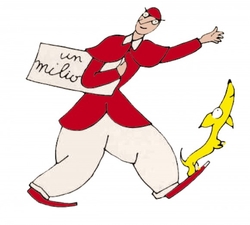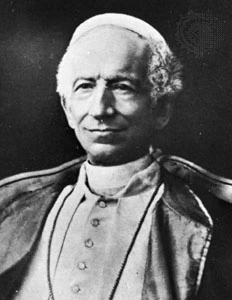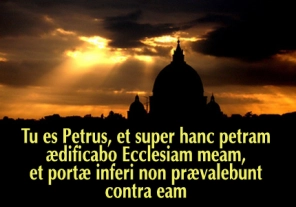Blog Archives
The Hermeneutic Of Catholicism.
I fear that the ‘hermeneutic of continuity’ has become the preferred tool of well-meaning eggheads and not so well-meaning heretics, while the rest of us puzzle over what the Church truly teaches these days.
What we need today is clear and unambiguous teaching at all levels of the hierarchy that does not rely on hermeneutics, but rather relies on clarity, and shuns ambiguity. We need clarity with clearly demonstrated continuity in all communications.
Thus Pat Archbold in one of his very good reflections, in which he complains that good, solid, Catholic texts – like all the encyclicals before the dratted Council – do not need any “hermeneutic”, whilst the “hermeneutic” has now in some quarters become an excuse to deny the reality of texts that have little of Catholic in them. I fully agree, though perhaps I use the word in a different context.
I have always been a supporter of the hermeneutic of continuity, in the sense that I consider that every official text of the Church must be taken – whenever possible; Francis is a completely new ballgame – in a sense that is in harmony with what the Church believes.
So, the encyclicals of the darn V II can, largely, be read in an orthodox way; and in what they say that is in line with what has been previously taught, they are certainly fine. If Luther says “two and two is four” this is not less fine because Luther said it. Here, Luther has been truthful. No, really.
This is, I think, the reason why not even the SSPX rejects the VII documents in toto, and why the Great Man himself signed – to my knowledge – all of them, which – to my knowledge – other refused to do. A bad document explaining the Truth in a bad way is still valid in the truth it teaches, because those truths cannot be invalidated just because wrapped in a mediocre or misleading document. Similarly, if a papal encyclical has some good things mixed with stupid or ambiguous or vaguely heretical or openly wrong statements, we might have to ask for the re-writing of the encyclical, but we will have to recognise the truth contained in its truthful parts in the meantime. We as Catholics cannot but read in a Catholic way, provided there is something Catholic to be read.
If Francis were to write an encyclical in which the Trinity is correctly explained, and Muslims are said to believe in the same God as Christians, the second statement should be rejected as heretical, and the part concerning the Trinity should be accepted as truthful. To do anything else means to make truth dependent on who writes about it.
I have proposed some time ago a “hermeneutic of embarrassment”, consisting in taking everything that is valid in the V II encyclicals whilst acknowledging the crap job made by the Council Fathers in mixing the good with the stupid, the comfortable, the bad and the plain evil. I have also proposed, concerning the mentality of V II, a hermeneutic of extermination, which I think is what the times are demanding from us. But in all this, I see no necessity to interpret the V II texts we have in any other way than reading them in a Catholic way, accepting whatever Catholicism they have in them and rejecting whatever is, in the actual words or in their erroneous hermeneutic, heterodox.
Still, I think Mr Archbold makes a very valid point: the “hermeneutic of orthodoxy” has now gone so far that even openly heretical statements are twisted in the most astonishing way to try to give them an orthodox meaning. But you see, this is not an exercise in hermeneutic anymore, but in blindness and Pollyann-ism.
There is no way “who am I to judge” can be interpreted as being anything else than secular crap. There is no way “there is no God!” can be interpreted anything else than a blasphemy. There is no way stating that the Blessed Virgin could have said “Lies!” at the foot of the Cross does not show that the one who makes such a statement does not understands jack of Catholicism, much less has any true devotion for the Blessed Virgin. There is no way stating that Christ misled the apostles can be interpreted in any other way than an offence to Christ. There is no way committing a grave liturgical abuse can be explained away as being anything else than a liturgical abuse. There is no way calling a proddie “brother bishop” can be understood in any way other than nonsense born of drunkenness, sheer stupidity or blank denial of Catholicism. Everyone of you has, I am sure, other examples.
In all these cases, there is simply no object for any hermeneutic. Words have meaning. Un-Catholic or anti-Catholic words just have a meaning deprived of, or contrary to, Catholicism. You just can’t interpret shit into chocolate.
The hermeneutic of embarrassment concerning the documents of V II, and the hermeneutic of extermination concerning the entire “ideology” of V II, must not lead us to close our eyes in front of the fact that heresy is heresy, nonsense is nonsense, and Francis is the enemy number one of Catholicism. These are facts that go beyond any effort of twisting the meaning of what is said. Meaning which, in the case of Francis, is perfectly clear before one begins the twisting.
But by all means: in all we can, let us continue to extract whatever is good from Vatican documents, lest a narrative should emerge according to which what was good before is not good anymore now. So if anyone were to ask me “do you accept or reject the V II documents?” I would answer that I accept everything that must be accepted, and reject everything that must be rejected. How do I know which is which? By comparing with what has been stated in the past. It truly isn’t difficult. Truth has a way of letting alarm bells go off when someone is departing from it. In the case of Francis, the noise is deafening every time he opens that stupid, lewd old mouth of his.
The Modernist mixes truth and error, and I will not reject the truth because it is mixed with error. But I certainly have the right – and, I think, the duty – to ask that those documents which either mix truth with error, or truth with ambiguity, be replaced by documents reflecting truth without ambiguity.
Not going to happen during this papacy, of course. The “hermeneutic of populism and socialism” is Francis’ preferred way of interpretation of pretty much everything.
Mundabor






















You must be logged in to post a comment.